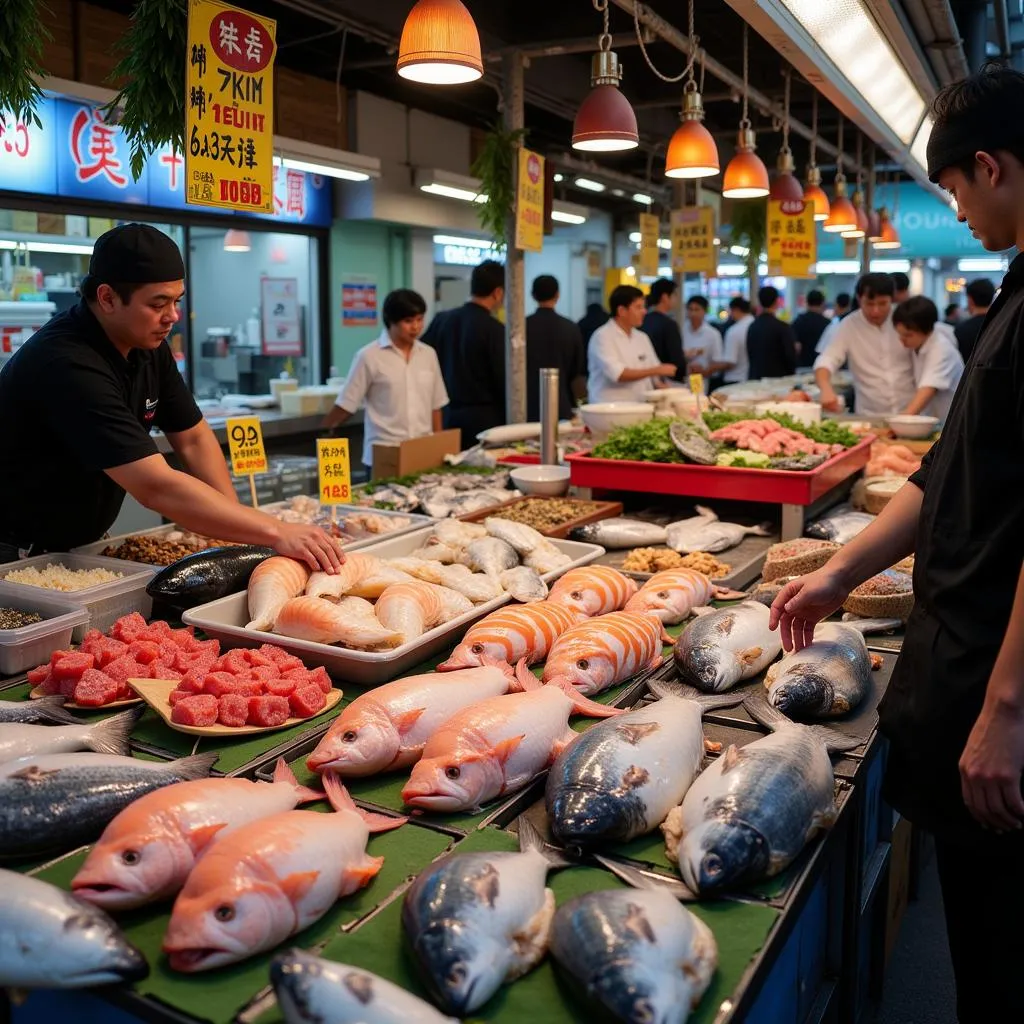Fish markets are vibrant, sensory-rich environments that provide excellent material for IELTS Speaking responses. This topic has appeared in past IELTS exams and is likely to resurface due to its relevance to daily life and cultural experiences. Let’s explore how to effectively describe a fish market visit in your IELTS Speaking test.
Part 1: Introduction and Interview
In this section, the examiner may ask general questions about fish markets or related topics. Here’s a sample question with a suggested answer:
Q: Do you like visiting markets?
A: Absolutely! I find markets fascinating places to explore. They’re not just about shopping; they’re a window into local culture and daily life. I especially enjoy the lively atmosphere and the opportunity to interact with vendors and fellow shoppers. It’s always an enriching experience that engages all my senses.
Describe a natural landscape in your country can be another interesting topic to discuss in your IELTS Speaking test, offering a chance to showcase your descriptive language skills.
Part 2: Long Turn
Here’s a sample cue card related to describing a fish market:
Describe a fish market you have visited
You should say:
- Where it was
- When you visited it
- What you saw there
- And explain how you felt about this fish market
Sample Answer (Band 6-7):
I’d like to talk about a fish market I visited in Phan Thiet, a coastal city in southern Vietnam. I went there last summer during a family vacation. The market was bustling with activity early in the morning, with fishermen bringing in their fresh catch and locals haggling over prices.
What struck me most was the incredible variety of seafood on display. There were rows upon rows of stalls selling everything from small sardines to large tuna, as well as shellfish, squid, and even some exotic species I couldn’t identify. The vendors were loudly advertising their products, creating a lively atmosphere.
The market was quite crowded and noisy, with a strong smell of fish and sea salt in the air. Despite the chaos, I found it an exciting experience. It was fascinating to see how the local fishing industry operates and to observe the interactions between sellers and buyers.
Overall, I felt a bit overwhelmed at first due to the sensory overload, but I quickly grew to appreciate the authentic local experience. It gave me a deeper understanding of the importance of fishing to the local economy and culture.
Sample Answer (Band 8-9):
I’d like to describe a memorable visit to the Tsukiji Outer Market in Tokyo, Japan, which I explored during a trip last autumn. This renowned fish market is a culinary landmark that has been integral to Tokyo’s gastronomic scene for decades.
Upon arrival in the early morning hours, I was immediately captivated by the frenetic energy permeating the air. The market was a hive of activity, with vendors meticulously arranging their displays of the day’s catch. The sheer diversity of marine life on offer was astounding – from glistening slabs of bluefin tuna to delicate sea urchins and vibrantly colored tropical fish.
What truly set this market apart was the unparalleled expertise of the vendors. Their deft knife skills were on full display as they expertly filleted fish with precision and grace. The pride they took in their craft was evident in every interaction, as they enthusiastically educated customers about the origins and preparation methods of their products.
The sensory experience was overwhelming in the best possible way. The briny scent of the sea mingled with the aromatic sauces and seasonings used in the market’s many food stalls. The cacophony of vendors’ calls, the sizzle of grills, and the animated chatter of shoppers created a symphony of market life.
Reflecting on the experience, I felt a profound appreciation for the intricate relationship between Japanese culture and the sea. The market epitomized the Japanese reverence for freshness and quality in cuisine. Moreover, it served as a poignant reminder of the delicate balance between human consumption and marine conservation. The visit left me not only gastronomically satisfied but also culturally enriched, providing a deeper insight into an essential aspect of Tokyo’s identity.
 Tsukiji Fish Market in Tokyo, Japan
Tsukiji Fish Market in Tokyo, Japan
Follow-up Questions
Q: How do fish markets contribute to the local economy?
A (Band 6-7): Fish markets play an important role in local economies, especially in coastal areas. They provide jobs for fishermen, vendors, and market staff. They also attract tourists, which can boost the local tourism industry. Additionally, these markets support related businesses like restaurants and food processing companies.
A (Band 8-9): Fish markets serve as vital economic hubs, particularly in coastal regions. They function as a nexus between the fishing industry and consumers, facilitating the distribution of seafood products. These markets generate substantial employment opportunities, not only for fishermen and vendors but also for a myriad of ancillary services such as transportation, ice production, and packaging. Furthermore, they often evolve into tourist attractions, injecting additional revenue into the local economy through associated hospitality and retail sectors. The ripple effect of a thriving fish market can be felt throughout the community, stimulating growth in restaurants, food processing plants, and even culinary education programs.
Part 3: Two-way Discussion
Q: How have fish markets changed over the years?
A (Band 6-7): Fish markets have undergone significant changes in recent years. Many have improved their hygiene standards and modernized their facilities. There’s also been a shift towards sustainability, with more markets promoting responsibly sourced seafood. Technology has played a role too, with some markets now offering online ordering and delivery services.
A (Band 8-9): The evolution of fish markets reflects broader societal shifts in consumption patterns, environmental awareness, and technological integration. Traditional open-air markets have increasingly given way to more structured, hygienic environments that adhere to stringent food safety regulations. There’s been a notable paradigm shift towards sustainability, with many markets now prominently featuring eco-certified products and providing detailed information on sourcing and fishing methods.
Digitalization has also revolutionized these age-old institutions. Many markets now leverage e-commerce platforms, allowing for online pre-ordering, virtual tours, and even live auctions. This digital transformation has expanded their reach beyond local communities, connecting them to a global customer base.
Moreover, there’s been a growing emphasis on the experiential aspect of fish markets. Many have diversified their offerings to include cooking demonstrations, tasting sessions, and educational programs about marine ecosystems and sustainable fishing practices. This multifaceted approach has transformed fish markets from mere commercial spaces into cultural and educational hubs, attracting a wider demographic of visitors.
Describe a time when you went on a boat trip could be an interesting topic to connect with the fish market theme, as many fishing communities rely on boats for their livelihood.
Key Vocabulary and Phrases
-
Bustling /ˈbʌs.lɪŋ/ (adjective): Full of activity, busy.
Example: The fish market was bustling with shoppers early in the morning. -
Vibrant /ˈvaɪ.brənt/ (adjective): Full of energy and enthusiasm.
Example: The vibrant atmosphere of the market was infectious. -
Aromatic /ˌær.əˈmæt.ɪk/ (adjective): Having a pleasant and distinctive smell.
Example: The aromatic scents of fresh seafood filled the air. -
Haggle /ˈhæɡ.əl/ (verb): To negotiate or argue about the price of something.
Example: Customers often haggle with vendors to get the best price. -
Culinary /ˈkʌl.ɪ.ner.i/ (adjective): Related to cooking or kitchens.
Example: The fish market is a culinary paradise for seafood lovers. -
Sustainable /səˈsteɪ.nə.bəl/ (adjective): Able to continue over a period of time without damaging the environment.
Example: Many markets now focus on selling sustainable seafood options.
Describe a place in your country you would like to know more about can be an excellent way to showcase your knowledge of local culture and geography, which can complement your description of a fish market.
Examiner’s Advice
To excel in describing a fish market visit during your IELTS Speaking test:
-
Use vivid sensory language to bring your description to life. Discuss sights, sounds, smells, and even textures.
-
Incorporate a range of vocabulary, especially words specific to markets and seafood.
-
Structure your response logically, perhaps chronologically or by focusing on different aspects of the market.
-
Show personal engagement by explaining your reactions and feelings about the experience.
-
Practice describing different types of markets to broaden your vocabulary and improve fluency on this topic.
-
Be prepared to discuss related topics such as food culture, tourism, or environmental issues in Part 3.
Remember, the key to a high score is not just what you say, but how you say it. Aim for fluency, varied vocabulary, and complex sentence structures while maintaining accuracy.
Describe a memorable day you spent with your family could potentially include a visit to a fish market, allowing you to combine personal experiences with descriptive language.
By following these guidelines and practicing regularly, you’ll be well-prepared to discuss fish markets and related topics in your IELTS Speaking test. Remember to stay relaxed and confident during the exam, and let your personality shine through in your responses.


